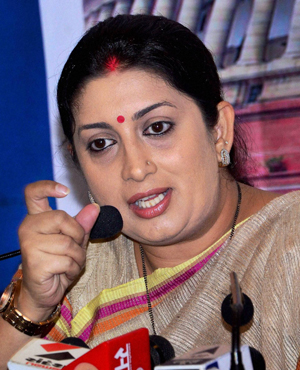New Delhi, Jan 20: Hitting back at political rivals, HRD Minister Smriti Irani today accused them of attempting to "instigate" students all over the country on the issue of suicide by a dalit student in Hyderabad University and dismissed demands for her resignation.

After keeping a low profile for the last two days, Irani addressed a press conference flanked by three ministers where she took on Congress leader Rahul Gandhi saying the party wants to "shoot" on the issue which is "expected but unfortunate".
The minister was at pains to project that the ABVP student, who was attacked in a student rivalry, belonged to the OBC community as was Union Minister Bandaru Dattatreya, who had written a letter to her about the attack.
Claiming that a "malicious attempt" was being made to project the suicide as a dalit versus non-dalit caste battle over which "passions" are being ignited, the minister rejected allegations that her ministry's intervention through letters had led to the suicide of the student Rohith Vemula.
Facing a number of questions, Irani said she did not want to get into political mudslinging or a blame game and was only bringing certain facts to set the record straight in the face of attempts to create caste divisions in the society.
"An effort is on to instigate students all over the ountry. My appeal is, please do not instigate students and communities deliberately.
"There has been a malicious attempt to ignite passions and present this as a caste battle which it is not. It is not a dalit versus non-dalit confrontation as has been the efforts of some to project it that way," she said repeatedly.
Asked about the resignation demand made by Gandhi during his visit to the University yesterday, "They need to look at all these facts. Today I want to answer (to his statements) only through these two reports," she said referring to the standard protcol followed in government from the UPA time.
Irani sought to downplay the letter of Dattatreya, who had sought action on the issue of clash between two student bodies and the "anti-national activities" in the varsity, and her ministry's five communications to the university as a follow-up, which have been blamed for the suicide.
Seeking to turn the tables against Congress, she produced a letter of Congress MP V Hanumantha Rao, who had written a letter in November, 2014 seeking her intervention over various issues including suicide by students of marginalised communities in four years due to "alleged caste discrimination".
"Why did the Congress not debate and fix the issue then? Why it is debating it now?, she asked adding "the Congress MP says it's not a new problem but one that persisted for four years. If they (Congress) had fixed the problem four years ago, perhaps Rohith would have been alive," the minister said.
Justifying the five communications in the present case, Irani said six letters were sent to the University by her ministry even on the complaint of Hanumantha Rao. She said whatever her ministry had done was done in accordance with the protocol of the Central Secretariat Manual of Office Procedure.
She also produced a certified copy of the suicide note of Rohith to say that it did not mention any university official, political organisation or any MP.
Irani said there was one last line to "ASA family" (Ambedkar Students Association)...sorry for disappointing all of you....There is some bad water in us".
She said the two-member fact-finding committee sent by the ministry to the university yesterday will return in the evening and give its formal report.
Asked whether she would go to Hyderabad, Irani said she would not make a visit as she would not like to give an impression of "interference".
The minister expressed confidence that justice will be done as a "fair probe" was being conducted. "
As a government we are very clear. We have a sent fact-finding committee. The committee will submit a report whether any due process was not followed. I will comment only after I see the report," she said.
Appealing for restraint, Irani said passions are being ignited by "wrong information, misrepresentation, misconstruing and twisting" of facts to project a wrong image.
At the press conference she was flanked by ministers Thaawar Chand Gehlot, Nirmala Sitharaman and Vijay Sampla.
Giving details of the case, Irani said it was the Executive Council of the University that approved the expulsion of five students including Rohith and an Executive Sub-Committee, which included a senior dalit faculty member, was subsequently constituted to go into the matter and it also upheld the punishment.
She also referred to the presence of a number of dalit officials including the hostel warden, who communicated the decision to keep them out of the hostel, to counter the charge of any anti-Dalit bias in the matter.
"The Executive Council was not constituted by this government. Members functioning in EC were nominated by previous UPA government," Irani said.
However, later at a meeting of the Executive Council, a lenient view was taken as expulsion would have deprived the students of the chance to continue pursuing their doctorate and it was decided to permit them into their departments, library and academic meetings but not in hostel, administration and other public places.








Comments
Add new comment